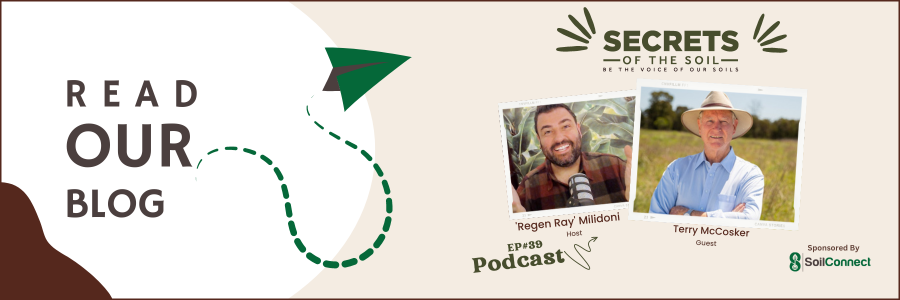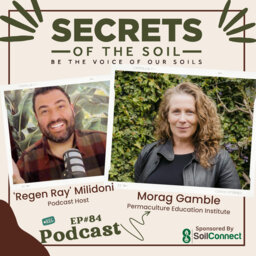We recently had the pleasure of hosting Terry McCosker on our latest episode of “Secrets of the Soil,” and his insights are nothing short of transformative. As a pioneering force in regenerative agriculture and the co-founder of RCS, Terry shares invaluable knowledge about the intricate relationships between soil health, human health, and sustainable farming practices.
Here are 3 key takeaways from this enlightening conversation:
🔹Holistic Land Management: Terry emphasizes the critical importance of shifting our focus from merely addressing carbon emissions to prioritizing overall land and soil health. This holistic approach not only improves the environment but boosts agricultural productivity and human well-being.
🔹 Educational and Economic Paradigm Shifts: There’s a pressing need to revamp our economic systems and educational frameworks to integrate the significance of soil biology. Investing in soil health and understanding its biological dynamics can render significant economic benefits, including earning potential through carbon credits.
🔹Practical Steps for Regenerative Transition: Terry outlines actionable steps for farmers and individuals alike—such as getting involved in gardening, using worm juice and compost extracts—to initiate small but impactful changes. He also highlights that improving soil carbon to 2% or above can significantly enhance soil health, leading to broader ecological benefits.
Let’s join hands to cultivate a deeper connection with our soil, fostering a resilient and thriving ecosystem. 🌍💚
Who is Terry McCosker
Terry is an internationally acclaimed teacher and has worked in research, extension, and property management in both government and private sectors for almost 55 years.
In his research era, Terry published over 40 papers and made several world-first discoveries in the 1980s in the fields of bull fertility, ruminant nutrition, and pasture ecology. Terry co-founded RCS over 35 years ago which has set the benchmark for capacity building in rural and regional Australia. He is responsible for the introduction of the GrazingforProfit™ School into Australia which now has over 8,000 graduates and has changed grazing, livestock, and business management nationally. Terry has chaired the Australian Beef Expo, has sat on numerous advisory committees, and has been nominated for many awards.
Terry was described in the Australian Farm Journal editorial in July 2010 as follows: “It is hard to imagine the mental toughness and commitment McCosker and his early farmer adopters had to muster to withstand the flood of criticism from within conventional agricultural science circles. … McCosker’s ideas took farming out of a war with nature to an association with it. He introduced Australian farmers to the concept of ecosystem health and developed methods of measuring it alongside financial health. Critically he introduced the concept of farm family well-being and welcomed female partners, siblings and parents into courses about decision making.”

The Indispensable Ties Between Soil and Human Health
In episode 39 of the Secrets of the Soil podcast, we were honored to delve deep into the world beneath our feet with agriculture expert Terry McCosker. With over 55 years of professional experience, Terry eloquently elaborates on the intricate connection between soil health and human health, emphasizing the role of the soil microbiome in influencing the integrity of agriculture and consequently, human wellbeing.
“No longer can we merely treat the soil as dirt,” McCosker urges, “it’s a living entity that demands our respect and understanding.” Through avenues like promoting healthier soils, we can enhance the nutrient profile of the food we cultivate, thus boosting human health.
Shifting the Focus: Beyond Carbon Dioxide
erry McCosker calls for a broader perspective on environmental challenges, highlighting that it’s not enough to merely place blame on carbon dioxide emissions. He shares his conviction that a holistic approach necessitates paradigm shifts not only in our environmental strategies but also within our economic systems.
“Carbon farming should be a secondary outcome of prioritizing land and soil health,” notes Terry. Healthy soil absorbs carbon naturally, which can subsequently lead to credits and substantial financial incentives for farmers committed to sustainable practices. His research into carbon sequestration for nearly two decades, particularly his findings on carbon storage beneath 30 centimeters of topsoil, underscores the unrecognized potential of soils.
The Value of Hands-On Connection with the Soil
Terry’s lifelong bond with the land shines through as he reminisces about his early days in farming, urging listeners to foster a similar connection. “Get involved in gardening, get your hands dirty,” he recommends, emphasizing the joy and educational value of engaging directly with the soil.
Terry also points out a worrying modern trend of germ phobia and disconnection from natural processes. Educating children about the origins of food and encouraging hands-on engagement with the soil are pivotal steps in bridging this gap. Host ‘Regen Ray’ Milidoni echoed these sentiments, sharing his personal outdoor activities to stay connected to nature.
Challenges and Changes in Agriculture
Reflecting on the evolving landscape of agriculture, Terry shares initial resistance and opposition within the regenerative agriculture space. It wasn’t an easy journey moving from conventional practices to a focus on soil health, but the rewards have been significant.
“Transitioning cropping industries is challenging,” he acknowledges. Unlike grazing, which permits relatively straightforward changes, crop management involves higher risks and a need for foundational shifts. However, Terry stresses that even small adjustments, like incorporating worm juice and compost extracts, can pave the way for larger transformations.
Empowering through Education and Economic Incentives
In universities, the limited focus on soil biology is concerning. McCosker emphasizes that education should place greater weight on understanding soil biology, given its essential role in agriculture.
Economic motivators, such as rising input costs, are currently driving the shift towards regenerative practices. Yet, Terry notes the importance of head and heart alignment, recognizing the interconnectedness of humans, plants, and soils. He recounts his efforts in introducing Elaine Ingham to Australia decades ago, laying the groundwork for the growing interest in soil biomes today.
Future Prospects and Community Support
Terry McCosker’s company, Carbon Needing, is at the forefront of advancing carbon sequestration projects, currently measuring baselines across a pipeline of 1.3 million hectares. McCosker highlights the unexpected findings in soil carbon levels, underlining the need for ongoing research and audit to harness soil’s full potential.
“With the right management, any environment can improve,” Terry asserts, citing a successful project in Western Australia as a case in point. This optimistic outlook is encouraging for farmers and soil enthusiasts aiming to make a tangible positive impact.
Taking Action for Healthier Soils
The key takeaway from this enlightening episode is clear: taking action towards healthier soils is not just about a mission; it’s about practical, incremental improvements that contribute to a larger paradigm shift.
The episode concludes with an earnest call to action. Listeners are encouraged to share the podcast, leave reviews, and connect with like-minded individuals. For more information and continued support, Terry’s company, Resource Consulting Services (RCS), offers ample resources for anyone eager to contribute to a healthier earth, one plot of soil at a time.






